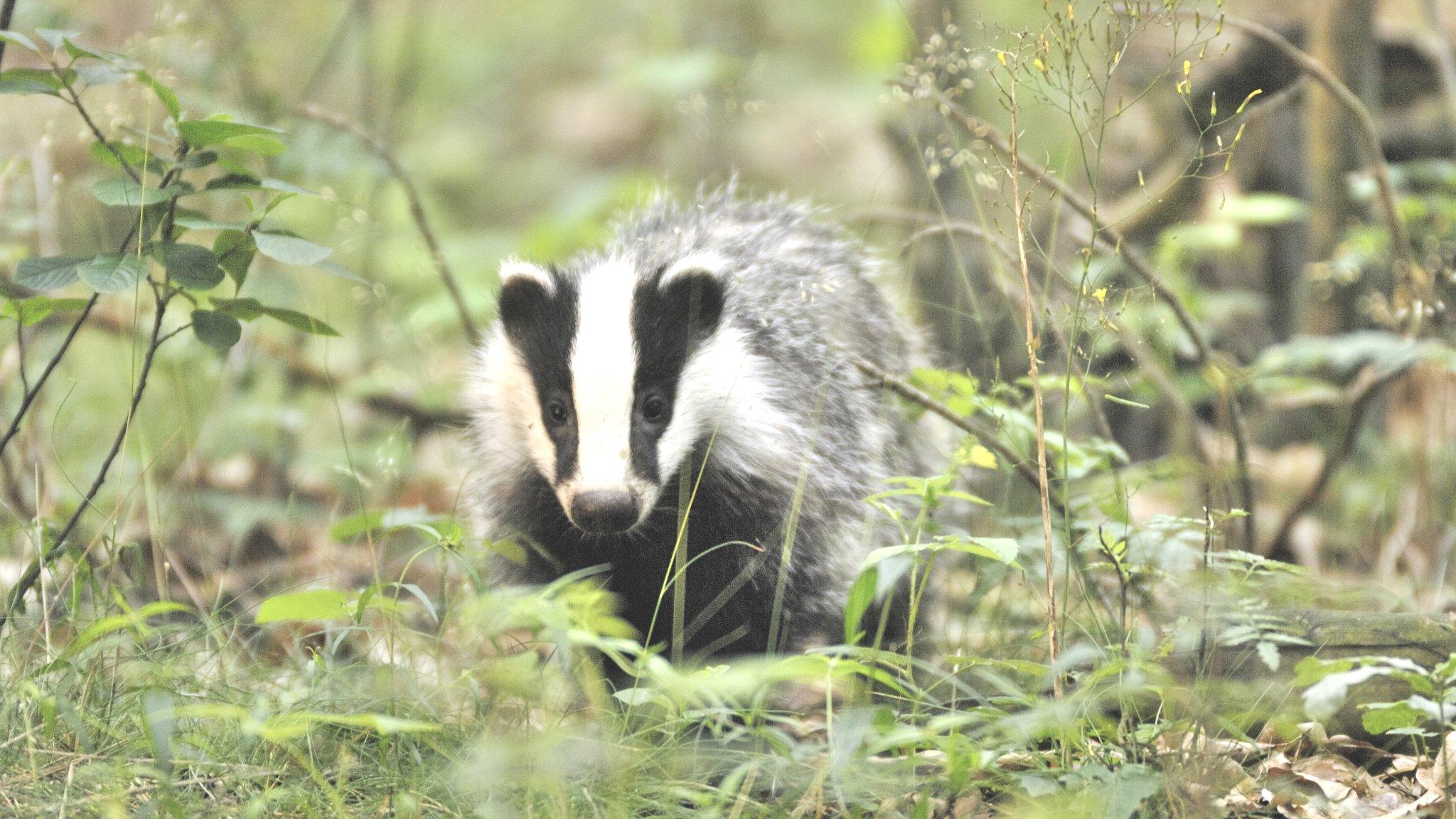Princess Anne: Gassing badgers is most humane way to cull
- Published
Princess Anne: "Gas is a much nicer way" of culling badgers
Gassing is the most humane way to cull badgers, the Princess Royal has said.
Princess Anne, who has lost 15 of her rare breed cattle to bovine TB in the past two years, was speaking to BBC One's Countryfile programme.
Ministers say using gas is being looked at but two pilot culls aimed at cutting TB in cattle, which involved shooting badgers, are not being expanded.
However, animal campaigners say culling will not stop bovine TB spreading and that gas is not a humane method to use.
The interview with Princess Anne at her Gatcombe Park estate in Gloucestershire was described by Countryfile as a "frank and wide-ranging" look at issues affecting the British countryside.
The Department for Environment, Food and Rural Affairs (Defra) had originally planned to introduce up to 10 new cull areas in south-west England every year.
But its own independent assessment, external showed that culls in two pilot areas had not been effective and raised questions about their humaneness.
The pilot culls had involved contracted marksmen shooting the animals at night.
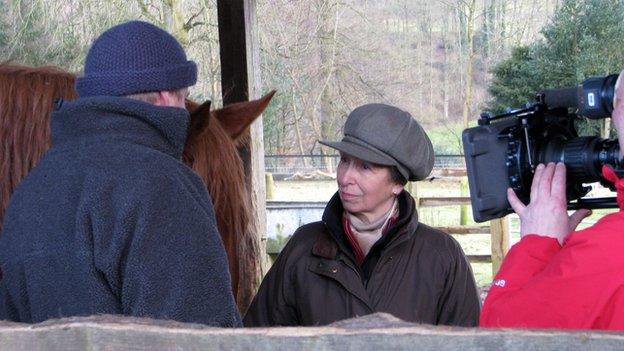
Princess Anne also discussed her views on horses, saying there were too many in Britain
Princess Anne, who has run Gatcombe Park for nearly 40 years, owns a herd of White Park cattle. In the past two years, 15 have been lost to TB, including two prize bulls.
She said of gassing: "Most of the people who did it in the past will tell you that gas is a much nicer way of doing it, if that's not a silly expression, because of the way it works.
"And how it works is that you go to sleep, basically."
'Outspoken views'
A senior member of the National Farmers' Union (NFU) said "farmers would welcome" Princess Anne's comments.
Andrew Guest, NFU county chairman for Gloucestershire, told BBC Radio 4's World at One: "The Princess Royal is noted for outspoken views and her forthright honesty.
"I think it's an option that needs looking at. And provided we can tick all the boxes as far as humaneness goes then it would certainly be an option to consider."
Gassing badgers has been tried before. Prof Rosie Woodroffe of the Zoological Society for London said when gassing with cyanide was used in the 1970s it did not work, leading to the practice being banned in 1982.
She told BBC Radio 4's Today programme: "If you go back to reports at the time, they are full of frustration about how it just wasn't very effective."
It was difficult to achieve lethal concentrations of gas due to the way badger setts are constructed and sub-lethal concentrations were "inhumane", Prof Woodroffe said.
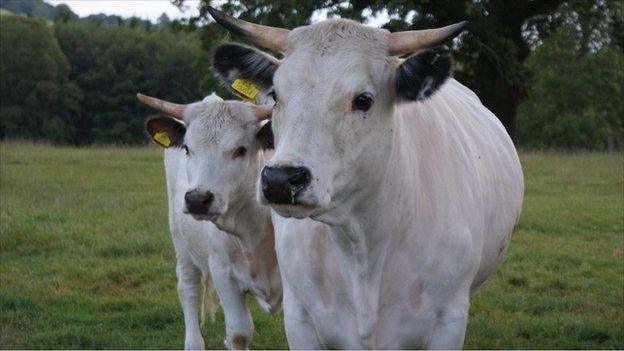
White Park cattle: Princess Anne keeps a herd of the rare breed on her estate but has lost 15 to bovine TB
The RSPCA said it was "strongly opposed" to the use of gas to control the badger population.
Its head of public affairs David Bowles said: "Killing badgers will not solve the problem of bovine TB in cattle, whatever the method of culling.
"The government would have to undertake field trials of gassing before any decision is made and this is unlikely to occur. The possible gassing of badgers adds a further outrageous twist to this misguided badger cull policy."
And Badger Trust chief executive Dominic Dyer warned that because gas did not spread through setts evenly "20 to 30% of the badgers will suffer prolonged painful deaths" if it was used in a cull.
He added: "Many would have brain damage. Many of these animals will then move between sets. You disrupt colonies and if they're carrying TB you're then going to disperse the disease more widely."
Horse meat
In a statement on Friday, Defra said: "Initial investigations into the use of gas as a potential culling method are taking place as set out in the 25-year strategy to free England of bovine TB, which includes plans for more sophisticated TB testing, developing cattle and oral badger vaccines, tighter cattle movement controls, badger vaccination in the buffer zone and badger culling in areas where disease is widespread.
"It is not possible to say at this very early stage if or when gassing is likely to be a realistic or humane method of culling."
Environment Secretary Owen Paterson has proposed a programme of vaccination around the edges of the most badly affected parts of the country.
This would create a buffer zone of immunity that would stop TB from spreading, he said.
Discussing horses, Princess Anne said there were too many in Britain - thousands of which were neglected.
"An awful lot of the abandonments are because they don't perceive there to be any value in the animals," she told Countryfile's Tom Heap. "So, 'okay - chuck them out, they'll survive or they'll die'.
"But the meat trade adds value to the animal, so there is some point in keeping it healthy if it's got an end point that it can go to."
Asked if she had eaten horse herself, the princess replied: "Oh, certainly."
She added that it was "very good, actually".
- Published3 April 2014
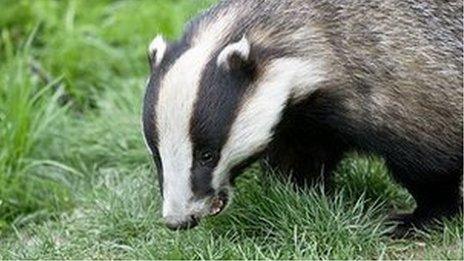
- Published10 October 2013
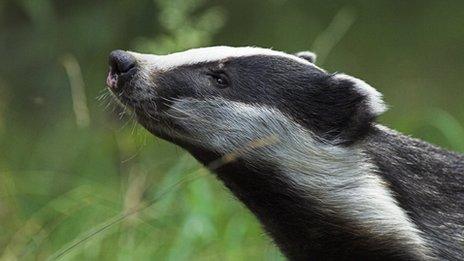
- Published23 October 2012
